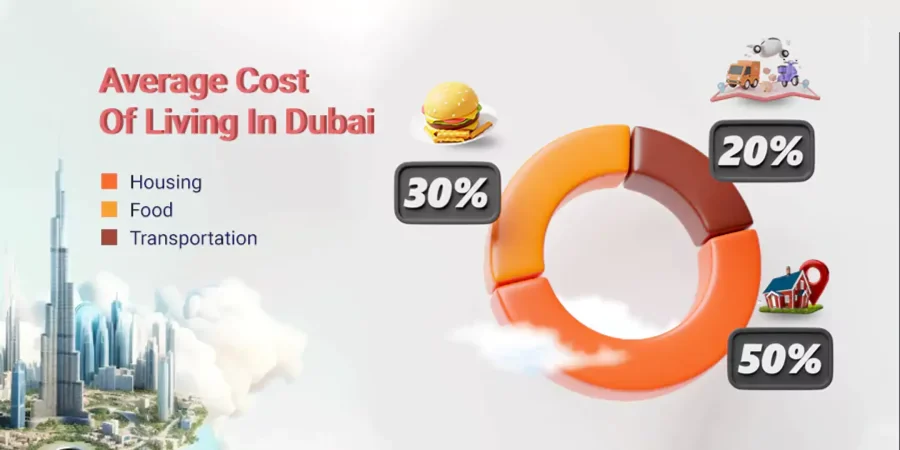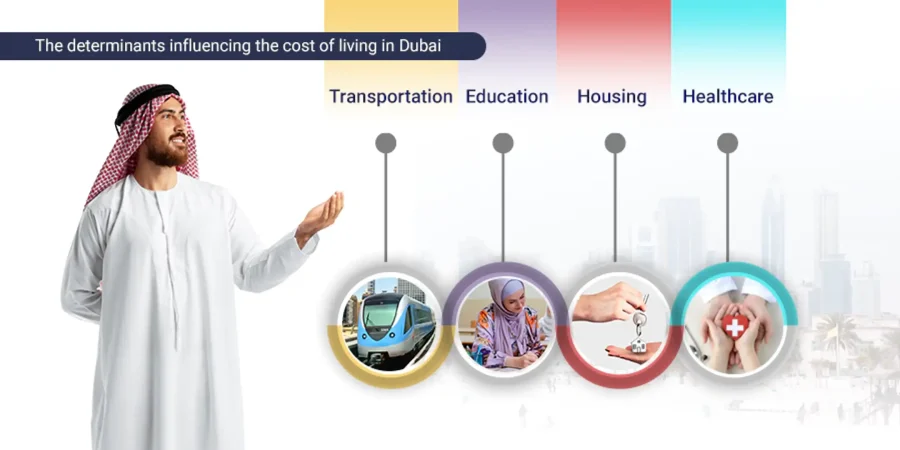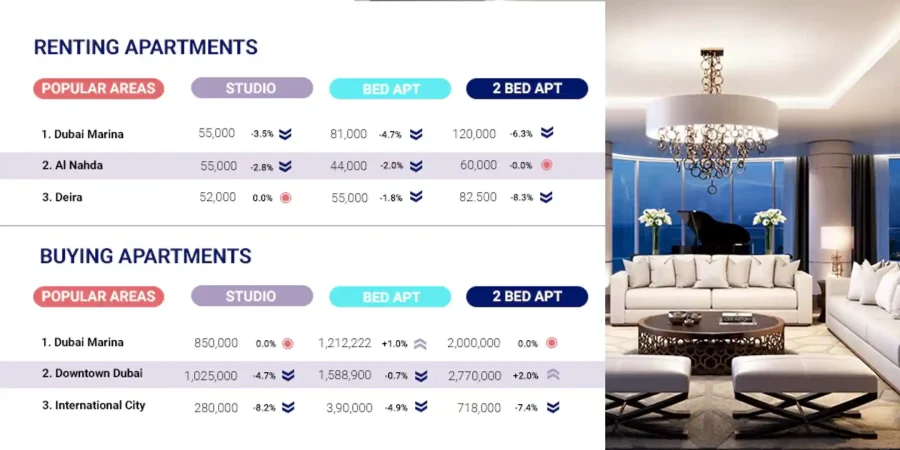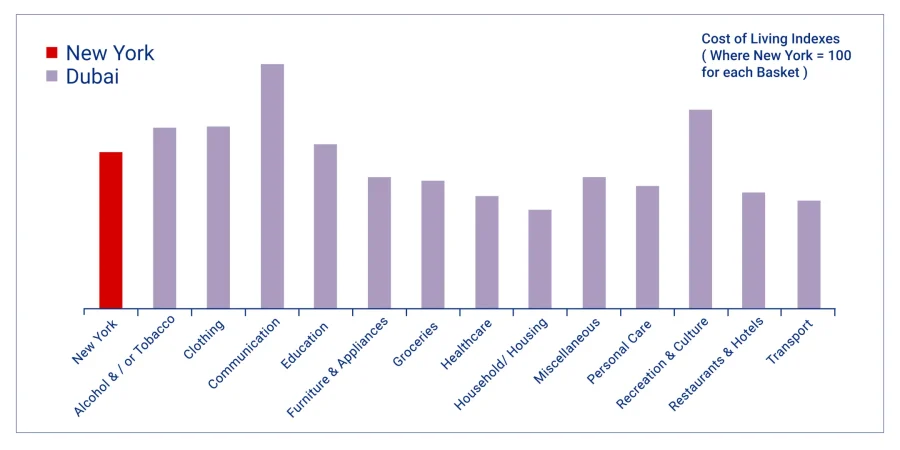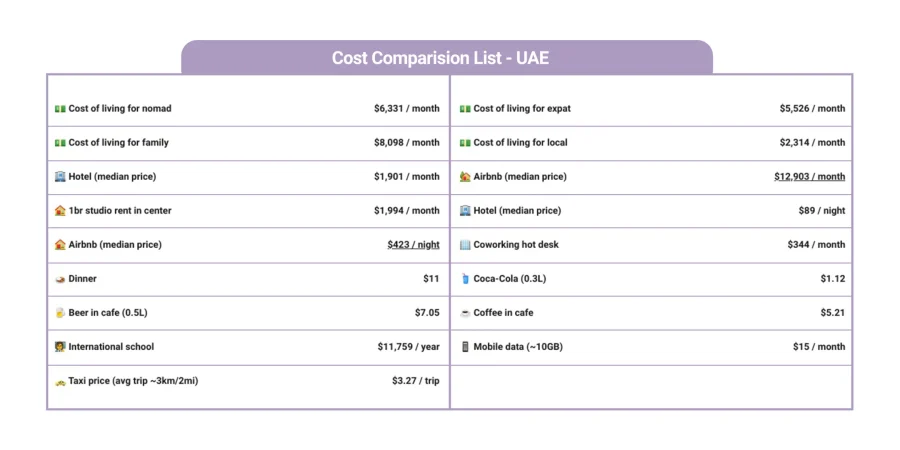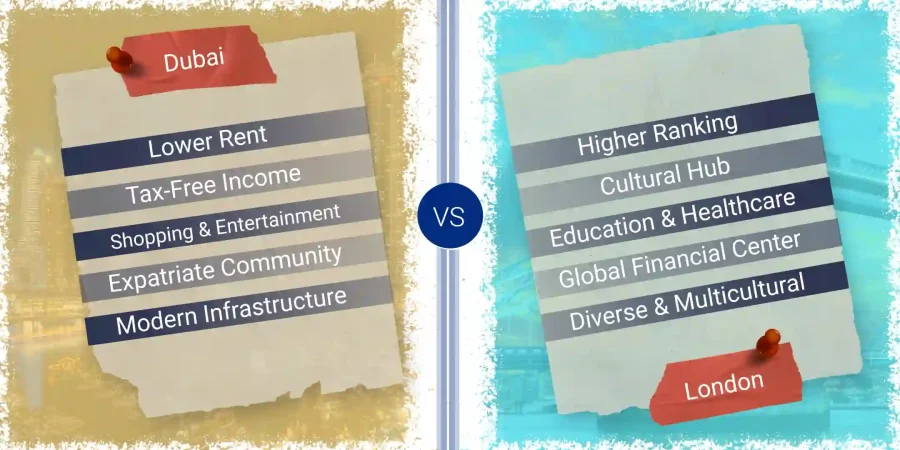When most people think about living in the UAE, they think about the rich, indulgent, and lavish lifestyle a person can live.
Although there is some truth to this, you should not let this cloud your vision when building your budget.
You do not have to stay in lavish hotels, dine in the best restaurants, and hire expensive transportation.
There are many different avenues where you can save money to afford the cost of living in expensive cities like Dubai.
The Dubai cost of living keeps fluctuating— just ask anyone who lives in Dubai. Until a few years ago, the rising costs of living were a huge concern.
However, dropping oil prices in the UAE, the impact of the pandemic, and securing global top talent have eased the financial burden on city-dwellers, as shown by Mercer’s annual survey.
Nineteen places down from last year’s 23rd position, Mercer’s 2021 Cost of Living City Ranking put Dubai at number 42 globally.
While Dubai dropped 19 places, Abu Dhabi moved down 17 places too— from the 39th to 56th position. This only goes to show that the UAE is an attractive and highly liveable place for ex-pats.
Live in other major ex-pat hubs such as Hong Kong, London, New York, or Singapore and you’ll find your expenses can add up exponentially.
However, Dubai is known as one of the prime places for ex-pats to settle because it offers so many advantages on the cost-of-living front.
Quick Summary
Even though Dubai is known for its luxurious lifestyle, there are ways to manage living expenses and make the most of your time in Dubai.
If you are an ex-pat professional relocating to Dubai, this blog helps you to gain insight into how much it costs to live here from housing to education to healthcare to transportation, which will help you plan your budget effectively.
Average Cost Of Living In Dubai
Living expenses are a vital facet of your budget. You should carefully consider it before making further decisions.
On average, 30% of living expenses go to housing. Roughly 15% goes to food and another 15% to transportation.
For the most part, expense costs vary depending on family size — the more people in a household, the higher these living costs tend to run on a monthly basis.
However, due to the improved cost of living in Dubai in 2021, the housing cost in Dubai for single person has dropped by 89.2%.
Not only this, the living cost in Dubai for a family of four has been reduced by 32.6%, according to Numbeo.
For example, a single person will have to pay over 3,400 AED (or 925 USD). The estimated cost for a family of four in Dubai is almost 12,000 AED (or 3,267 USD).
What Are The Factors That Affect The Cost Of Living In Dubai?
The cost of living in Dubai is one of the factors that has made it a prime location to live, work and invest in.
For years, there has been an influx in the number of expatriates who are settling in Dubai and are in search of job opportunities.
It is vital to consider a few key factors when estimating the average monthly cost of living in Dubai for a single person, couples, and families. They are:
- Housing
- Education
- Healthcare
- Transport
Housing
Dubai has been running with a high rent price since before the pandemic hit.
It ranks fourth internationally for people spending the highest proportion of their monthly income on rent.
Three-bedroom residential property prices would cost you an average of 7,054 United Arab Emirates Dirham (AED).
This comes to approximately 39.85% of their expenditure. A relatively high supply with not enough demand has caused a housing crisis in the UAE.
However, the situation worsened after the spread of the disease.
Many long-term residents in the UAE left for their home countries as a self-precautionary measure.
As of October 2021, the average price for properties in Dubai has continued to rise, increasing by 4.4% in the past year.
This is the highest year-over-year growth since February 2015. According to a report from CBRE on residential property in Dubai, an increase in independent villas is continuing.
Sadly, the apartment sector remains sluggish with no signs of picking up.
On average, rents are falling by 2.7% month-on-month as opposed to rising 4.4% year-on-year which signals continued weakness in the unsettled monthly rental market.
The average rent for an apartment in Dubai fell by 5.2% year on year in August, while villa rents grew by 15.5%- which is a record high.
pros
- Housing options range from luxurious villas to affordable apartments, to suit all budgets and preferences.
- Housing is high quality, with modern amenities.
- Renters’ rights are protected by UAE government measures.
- High standards of living, excellent infrastructure, and a wide range of services and entertainment options.
cons
- Rent and housing costs are high
- There is volatility in Dubai’s housing market, making it difficult to forecast and plan.
- Demand for Dubai housing exceeds supply, resulting in shortages.
Cleaning Services
Related expenses to housing vary depending on the region you are in and will have a major impact on your budget.
For example, full-time domestic help services- such as house cleaning- cost over 2,500 AED ( or USD 680) per month according to Dubai city standards.
These costs can add up quickly.
You should keep such monthly expenses in mind when planning for the future. If this is out of budget, you can also hire part-time help at lower costs.
pros
- You can focus on other important tasks by hiring a cleaning service.
- A cleaning service provides thorough, efficient cleaning.
- Clean and organized home, which can improve your quality of life.
cons
- High Cost: As mentioned earlier, the cost of full-time cleaning services in Dubai is quite high, which can be a significant financial burden for many households.
Education
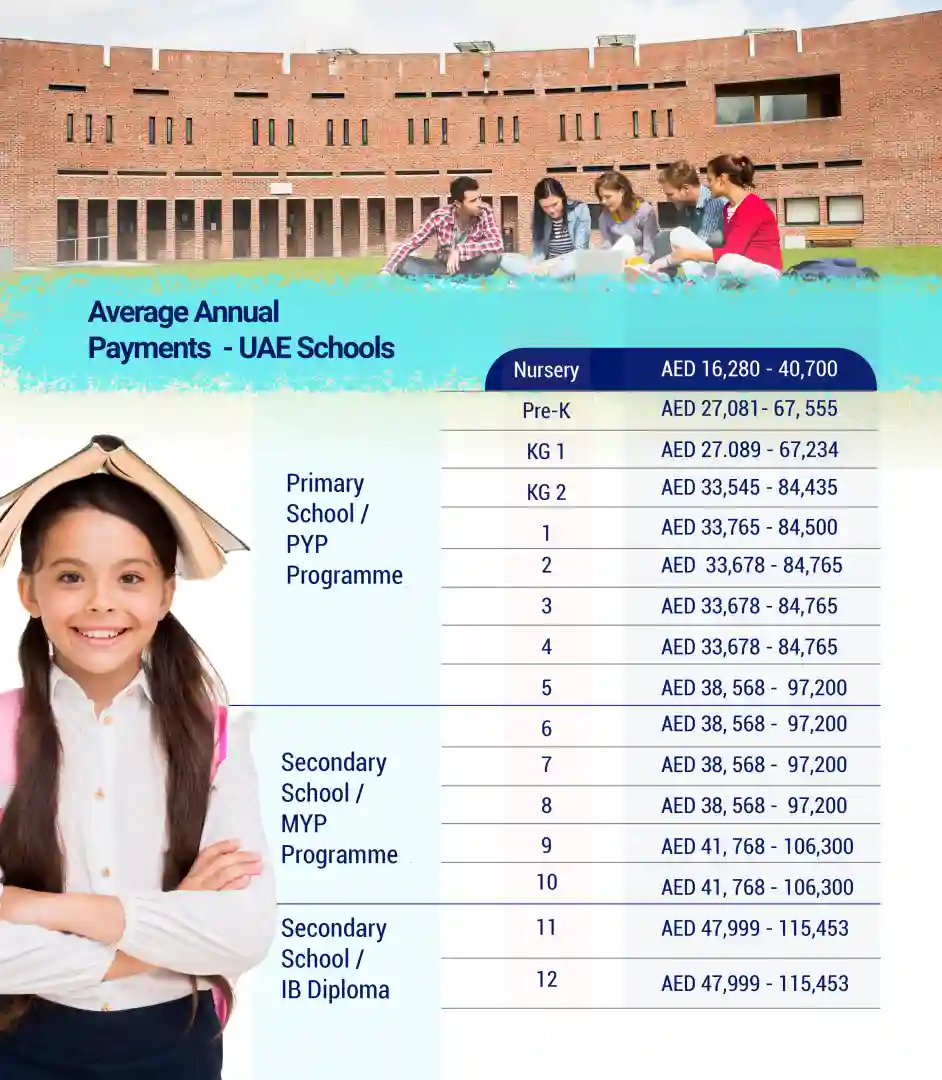
It’s clear that a quality education system is an important ingredient in the recipe for the success of any country.
It is particularly so in Dubai, the capital and most populous city of the United Arab Emirates.
As discussed earlier, the cost of school fees will add to the expenses of living in Dubai for families.
Private Schools
Currently, there are 194 private schools open in Dubai alone, and 17 have been rated as ‘outstanding’.
The other ratings include very good, good, acceptable, and weak. These ratings were shared by the Knowledge and Human Development Authority (KHDA)— a wing that monitors the quality of private education.
The high standard and quality of education have been facilitated by a range of factors including the vast majority of faculty members being highly qualified.
Here’s what the average school fees look like in Dubai-
International school fees can cost you somewhere between 12,000 AED to 64,000 AED (or 3,000 USD to 17,500 USD).
The steep cost is mostly due to their coveted location and area, but also for their facilities, teacher credentials, and ability to attract pupils from around the world which naturally includes a hefty price tag.
Most international schools rely heavily on parent donations and government funding.
Public Schools
It seems that the UAE may be the best place for families with international ex-pat status where education is concerned.
Ex-pat children can attend both public and private schools. However, whichever one they choose, they must pay fees since free schooling exists only for Emirati nationals.
The annual tuition fee for public schools has been capped at AED 6,000 ( or USD 1,635), per annum which means that most ex-pat families will not have undue financial difficulties trying to arrange suitable education for their little ones.
Higher Education
Dubai boasts a wide variety of educational options for anyone looking to further their studies.
Found within 65 schools, you’ll find a myriad of different disciplines to choose from.
Dubai’s public universities generally use Arabic as the medium of instruction. Nonetheless, most private institutions will teach in English.
Undergraduate degrees range in price depending on the school type and discipline studied. The average cost could be a little over 170,000 (or 46,000 USD).
For graduate programs, it’s best to expect relatively similar costs at an average of between 54,000 AED to 82,000 AED (or USD 14,700 to 22,300 USD).
However, they can increase or decrease depending on your field of study.
pros
- High-quality education
- Wide variety of educational options: Dubai offers a wide variety of educational options for both undergraduate and graduate programs.
- Ex-pat families can access public schools
cons
- High cost of private education
- Limited free schooling
- Cost of living increases
Healthcare
Dubai is known for its glitzy airports and lavish hotels, but there’s more to the emirate than just swanky establishments.
Dubai residents who want to avoid expensive ER and outpatient fees must take the initiative and enroll in one of the healthcare plans run by their government.
With this, you will be covered for any expenses that may otherwise come with a hefty cost.
Those who are employed by companies or who might otherwise have personal businesses can take advantage of attractive offers available through private insurance providers.
Medical insurance premiums will vary depending on the coverage, with the Essential Benefits Plan (EBP) starting from AED 600 per year.
In contrast, an individual’s comprehensive medical coverage can cost around AED 5,500 per year.
For a family of four, a comprehensive plan can cost around AED 15,000 – AED 25,000.
However, if you add worldwide coverage and other premium benefits, the cost of medical insurance in Dubai for a family of four can even go as high as AED 70,000 or more.
As an ex-pat, if you’re not already covered by your employer’s plan, you might consider looking into one of the many options available from personal insurers based in Dubai.
If you are earning a lower monthly salary range or don’t have a job, you are eligible for the Essential Benefits Plan.
Launched in 2014, EBP is available to all Emirati nationals who earn low salaries and can provide proof of it.
This program provides primary health services (medical visits, check-ups, medication, lab tests, etc.) at a minimum cost.
pros
- Individuals and families can reduce their financial burden with healthcare plans offered by the government and private insurers.
- EBP provides affordable primary healthcare for low-income people.
- Private insurance providers offer attractive offers and benefits to employees of companies and personal businesses.
- Dubai has world-class medical facilities and highly qualified medical professionals.
cons
- Healthcare can be expensive, especially for comprehensive plans.
- The cost of medical insurance for a family of four can be as high as AED 70,000 or more, which can significantly affect the cost of living in Dubai.
- Those who are not covered by their employer’s plan may have to pay higher premiums for personal insurance.
- The EBP may not cover all medical expenses, and individuals may have to pay out of pocket for certain treatments or procedures.
Transport
In Dubai, the basic cost of living may be higher than in many places in the world but transportation cost isn’t particularly expensive.
In fact, you can get from one side of Dubai to the other for a couple of Dirhams. After all, it’s a country that’s rich in oil. It’s no surprise then to find out that there’s lots of traffic on the roadways.
This can make driving slower than usual. If you have to travel, then it might be better to just walk or take public transport instead.
One liter of petrol averages at 2.46 AED and diesel at 2.56 AED (as of January 2022). This cost less than 1 USD which makes it considerably cheap.
The price of gas is significantly cheaper than in most places and is relatively stable too.
pros
- Getting around the city isn’t expensive with public transportation.
- If you drive a lot, petrol can be an advantage for you.
- Without owning a car, Uber and Careem make it easy to get around.
cons
- At peak times, traffic in Dubai can make getting around difficult.
- Owning a car in Dubai can be expensive due to the high cost of registration, insurance, and maintenance.
- Parking costs can also be quite high in some areas.
Cost Of Living In Dubai vs London
Is Dubai expensive? Yes. Dubai is an expensive city compared to other UAE locales.
However, according to the latest report by Mercer’s Cost of Living Survey, London is slightly more expensive than Dubai.
The survey ranked Dubai at number 42, while the United Kingdom capital came in at a higher position- number 18. Due to this, monthly rent/annual rent is cheaper in Dubai as compared to London.
Other monthly expenses like groceries or clothes are also higher than those in Dubai.
The average monthly expenses for food vary depending on whether you buy groceries and cook at home or prefer eating out regularly.
Personal preferences such as food and clothing choices or even internet plans can affect some of these expenses, for example.
If you move to London (United Kingdom), you will need around 25,239.05 AED (5,055.14£) if you wish to maintain a similar standard of living expenses that you enjoy in Dubai (UAE) at 17,000 AED.
How To Make The Most Of Your Time In Dubai
Life in Dubai is anything but dull.
Whether going against the current and fighting to get your dreams off the ground, meeting people from far-away countries, or just getting away with simple mischief; you’ll know new adventures every day.
Some days can be a lot of fun while others may be busy. Whatever it is, almost every single day here offers at least one new adventure worth talking about.
Remember that the living expenses in Dubai are comparatively higher before you move here.
To combat these expenses from getting to you down the line, it is best to hire a financial advisor. They can help you with your short-term and long-term investments.
This way, whether you’re concerned about wealth accumulation or retirement planning, they will have a personalized plan for you.
We provide unbiased and personalized investment solutions for our clients. We keep your financial goals in mind and use the right strategies along with financial tools to help you reach them.
Closing Thoughts
The city of Dubai is a great place for anyone looking to take up residence as an ex-pat. As of 2021, there are 88.52% of ex-pats residing in the UAE.
There are plenty of work and business opportunities for singles and families alike. You will even be able to find stability without sacrificing your sense of adventure!
The majority of people here are friendly, which makes settling in easier.
If you decide to make the city your home, most companies will pay for you to live close by. Apart from that, accommodation prices and quality will vary across the city.
If you are relocating from another country, you must consider how much distance can cost. If you are from the US, you will be well versed in paying for health insurance.
But, if you’re from the UK, this may not be considered a norm. In the UK, this is not something that everyone pays automatically.
You must understand that moving to another country comes with an innumerable number of costs – including buying a new car and fees for registration, etc. We do not want to dissuade you from finding success abroad.
That’s why the best way to mitigate any costs before making a move is to do thorough research beforehand.
So that your relocation plans don’t turn out to be too costly, it is best to consult a financial advisor for investment plans.
Frequently Asked Questions
Is Dubai an expensive city to live in?
Yes, Dubai is considered an expensive city compared to other UAE locales. However, according to the latest report by Mercer’s Cost of Living Survey, London is slightly more expensive than Dubai.
What are the major expenses to consider when living in Dubai?
The major expenses to consider when living in Dubai are housing, education, healthcare, and transportation.
How much does it cost to rent an apartment in Dubai?
The cost of renting an apartment in Dubai varies depending on the location and size of the apartment. On average, a one-bedroom apartment in the city center can cost around AED 5,000 per month and AED 8,000 per month.
Is healthcare expensive in Dubai?
The cost of healthcare in Dubai can be high, especially for comprehensive plans with premium benefits. However, healthcare plans offered by the government and private insurers provide coverage for medical expenses, reducing the financial burden on individuals and families.
How much does it cost to send a child to a private school in Dubai?
The cost of private education in Dubai can be very high, with international school fees ranging from 12,000 AED to 64,000 AED per year.
Is public transportation affordable in Dubai?
Yes, public transportation in Dubai is affordable, making it easier for people to get around the city without breaking the bank.
Should I consult a financial advisor before moving to Dubai?
Yes, it is best to consult a financial advisor before moving to Dubai to help you plan for short-term and long-term investments and mitigate any potential costs.



